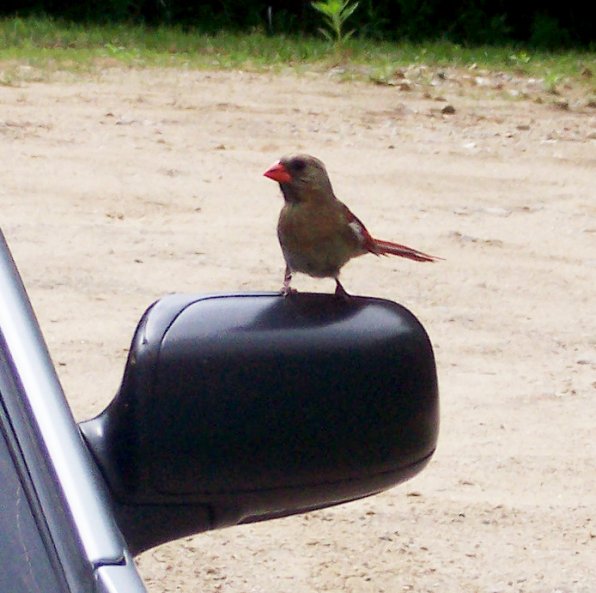My wife and I watched quite a bird battle from the window of our house one recent day. A female cardinal squabbled and scratched at her perceived opponent for half an hour. Her foe? Simply her reflection in the side mirror of our parked car.
I described the cardinal's behavior to Rebecca Suomala, who for 24 years has been a biologist at the New Hampshire Audubon Society on Silk Farm Road. She explained that the cardinal was merely protecting her territory from intruders.
“Each year,” she said, “we get over 50 calls from people who are frustrated with birds flying into their windows, some early in the morning hours, disturbing their sleep, and they want to know what to do about it.”
Suomala talked about how most birds establish a territory that can vary in size depending on the bird species and the season of the year. She reasoned that by having a defined territory, birds can protect a quality feeding area, especially when they are raising young.
While small songbirds have to be concerned with hawks and other predators, their greatest conflicts are with birds of their own kind. They want to guard their nest, their mate and their source of food.
Speaking about aggressive bird behavior, ornithologist M.M. Nice said, “If it is not defended, it is not a territory.”
John Burroughs wrote, “From spring to early summer, a bluebird could be seen fluttering and pecking against my window near its nest. The bird saw its image in the glass and was making war, he supposed, upon a rival.”
Cardinals can have two broods each year. During the two weeks after the first fledglings have left the nest, the male will continue to feed them, while the female incubates the eggs of the second brood. Their food consists of insects, fruit and seeds.
One of our most admired songbirds, the cardinal is the state bird of seven states. The male has bright red feathers while the female's plumage is browner with a slight hint of red. Both male and female wear a raised crest on their heads.
The cardinal's splash of color is a welcome sight at winter feeding stations that bird lovers keep filled with sunflower seeds. Cardinals are non-migratory and their melodious whistle can be heard year-round. These songsters use their music to help protect their territory as they patrol their borders. They are proclaiming in song, “This is my turf. This is my mate. You have been warned. Promptly relocate.”
Check out nhaudubon.org and click on “Ask the Naturalist” if you have a bird striking your window. There, you can find all the helpful tips that Suomala would tell you on the phone.
I did, and you can too.
The cardinal battling her likeness in our car's side mirror must have been thinking “Mirror, Mirror, on the car/ Who's the fairest bird by far?” She finally left and never came back. Her nonexistent intruder must have won the squabble. We can learn a lesson from the cardinal; after all, some of our personal battles can be against foes that exist only in our imagination.









